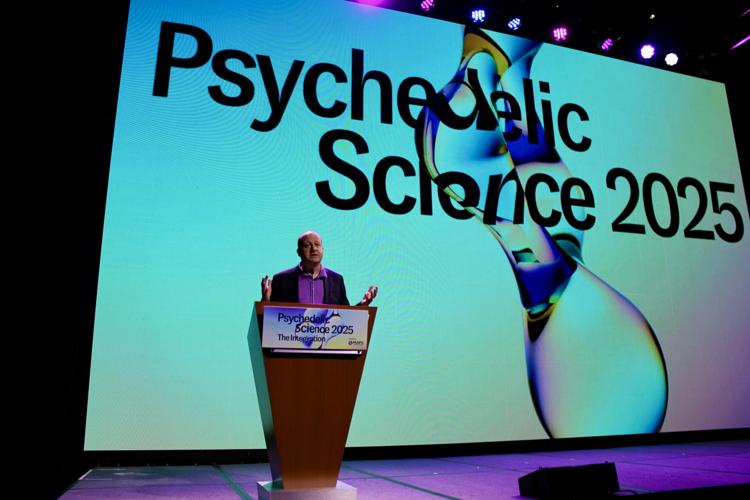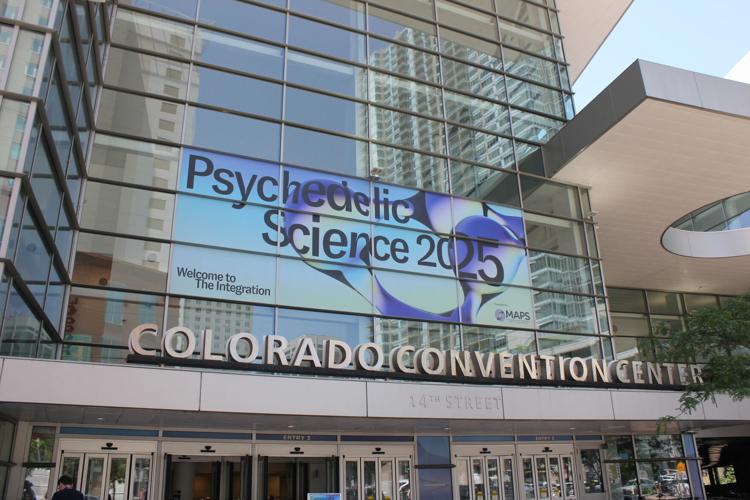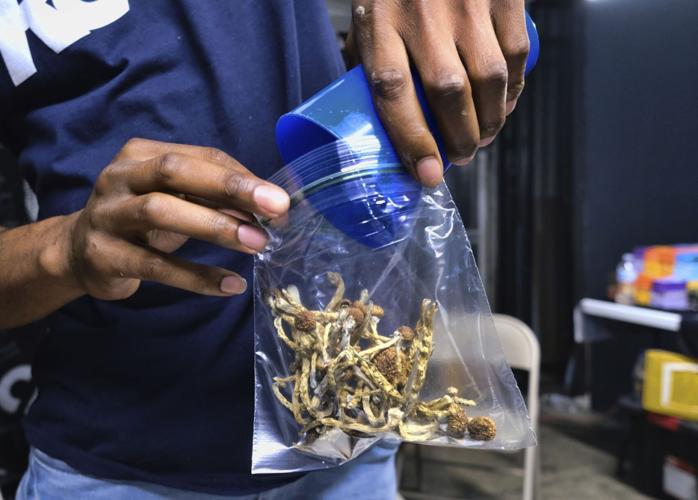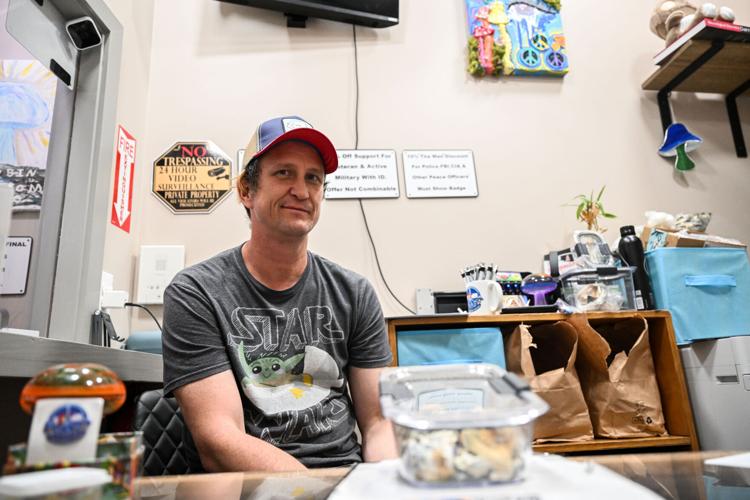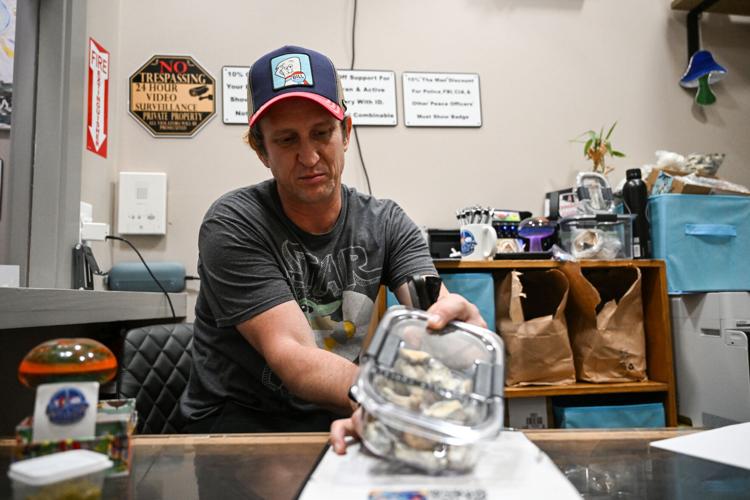As psilocybin industry launches in Colorado, hope and worry collide
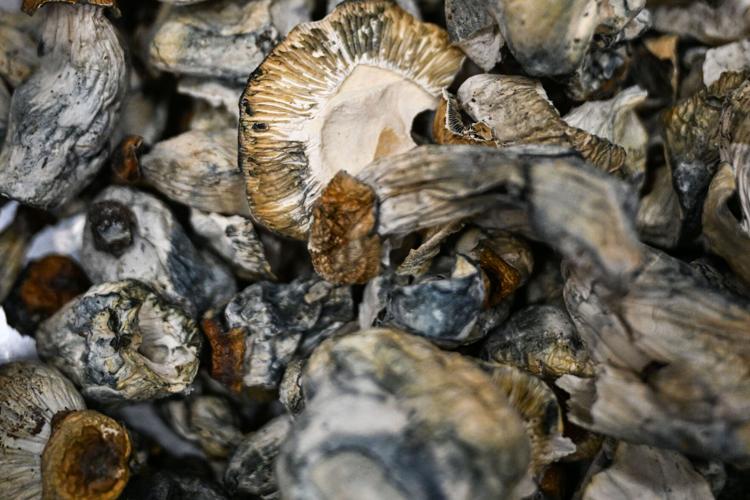
A bag of Hillbilly Pumpkin, a strain of psychedelic mushrooms, sits in the back room of Lyman Support Centers in Denver, which offers psychedelic mushrooms as microbuses, lotions, and other products as a therapeutic service. A new study from Denver Health has found that use of psilocybin has increased from 25 million in 2019 to more than 31 million in 2023, putting it second only to cannabis. (Stephen Swofford, Denver Gazette)
Stephen Swofford/ Denver Gazette
On the surface, Colorado’s budding psychedelic industry had several causes for celebration in the last few weeks: Gov. Jared Polis announced mass pardons for psilocybin convictions and the state saw its first patient take a dose of “magic mushroom” — all coinciding with a conference that drew thousands to Denver.
Bigger questions lurk just underneath those developments.
With the state’s psilocybin program now starting to become fully operational, conversations around cost, regulation, commercialization and access — including ensuring children don’t get their hands on the hallucinogenic drugs — are surfacing, some reminiscent of debates from Colorado’s cannabis rollout.
Passed in 2022, Proposition 122 made Colorado the second American state after Oregon to legalize certain psychedelics statewide. The state’s framework includes licensed psilocybin centers, where, as envisioned, facilitators supervise sessions, while also allowing adults to grow and share — but not sell — mushrooms outside the regulated market.
Critic: It’s ‘the same exact playbook’
Unlike with cannabis, which can cost as low as $11 per gram at a local dispensary, the regulated psilocybin sessions can cost hundreds or even thousands of dollars, while business license fees range from $3,000 to $6,000 in the first year, according to consulting firm Psychedelic Alpha.
Those high costs have prompted worries from some legislators who fear a black market could develop, not unlike what exists in the cannabis space.
Sen. Judy Amabile, D-Boulder, said when crafting the psilocybin regulation framework, lawmakers tried to ensure the regulated market would be affordable and accessible enough to draw people away from informal use, which she fears could turn into a “larger black market or gray market.”
“If you don’t make the regulated market attractive and doable, then everybody will just be in the unregulated market,” Amabile said.
Amabile also raised concerns that, like cannabis, psilocybin-infused edibles could pose risks to children.
“Kids don’t eat stuff that doesn’t taste good,” she said. “Having these sugar-sweetened products in your home — it’s just leading to a road that I don’t think we want to go down.”
Even today, more than a decade after Colorado legalized cannabis, policymakers worry about how to inoculate children from the drug and about its potency levels, particularly in light of new data about how doctors are now contending with — a New York Times investigation explored — the effects of an “explosion in the use of the drug and its intensity,” and how, “with more people consuming more potent cannabis more often, a growing number, mostly chronic users, are enduring serious health consequences.”
And more recently, a Denver Gazette investigation, citing industry insiders and researchers, found that the Colorado industry is riddled with loopholes that allow consumers to be deceived about everything from the marijuana’s potency, to the prevalence of dangerous pesticides, solvents and mold.”
Meanwhile, some worry commercial interests have shaped the psilocybin framework from the start.
“They are using the same exact playbook (as the cannabis industry),” said Dawn Reinfeld, executive director of Blue Rising, an advocacy group that opposed Proposition 122.
She pointed to the $4.6 million spent by the New Approach PAC to support the proposition, while the opposition group, Protect Colorado’s Kids, raised just over $50,000.
Reinfeld said her organization opposes “defining medical treatments through ballot measures — especially when the ballot measures are funded by business interests.”
Psychedelics advocate: ‘We’re talking about transformative care’
Many in the psychedelic community insisted that comparisons to cannabis often miss differences. Notably, they argued that the psychedelics they’re promoting would address major mental health issues.
“With psychedelics, we’re talking about transformative care… not just symptom relief,” said Joshua Kappel, an attorney with Vicente LLP, a law firm providing services to marijuana, hemp, and psychedelics businesses. “This is about addressing root causes of depression, PTSD or addiction.”
Kappel noted that the psychedelic market is far smaller and more restricted than cannabis, and most people use psilocybin infrequently, while daily cannabis users have surpassed those who drink alcohol everyday in the U.S.
And unlike cannabis, he said, there are no dispensaries for take-home use. Under the law, legal mushrooms must be consumed on-site under supervision.
Even so, many worry that the presence of both regulated and unregulated access has created legal gray areas for some businesses.
“Somebody can claim to be a healer, basically put up a website, put out a shingle, and say that they’re a healer and actually work as a facilitator without qualifications,” Reinfeld said. “Often, the people that are going to these practitioners are really vulnerable.”
‘Fully launched’
In Denver, Darren Lyman operated what he previously told The Denver Gazette was a “harm reduction support center” and offered consultation around psychedelic use. He said mushrooms were gifted — not sold. The state issued a cease-and-desist order in late 2023, citing ads that included specific prices — a violation of rules banning sales and off-site consumption.
Since early this year, Colorado has licensed a small number of facilitators, cultivators, and most recently a testing laboratory — which, officials said, means “the regulated natural medicine supply chain is complete and the program is fully launched for operations.”
Colorado learned from Oregon’s rollout, maintained Eric Vaughn of ETC Hospitality, a center still awaiting licensure. Vaughn touted the state’s system for being easy to navigate and supportive of businesses “getting our feet underneath us in this first year.”
“The state’s licensing framework really focuses on safety and accessibility,” he said. “They were able to adopt what worked and iron out some of the wrinkles.”
Lindsey Morris of the Center for Medicinal Mindfulness in Boulder described the process as “a mix of excitement and challenge.” She said it can be difficult to translate traditional and community-based psychedelic practices into state-approved formats.
“We’ve had to adjust curriculum, documentation, and program structure to meet evolving state criteria, all while trying to preserve the heart of the work. It’s doable, but it takes careful intention,” she said.
The ‘unregulated’ space
Some advocate for an “unregulated” space, arguing it offers important access to people who can’t afford clinical therapy or prefer a personal or spiritual approach.
“One thing I think the unregulated market does is it puts the power and autonomy back into the individual,” said Dr. Alan Davis, a researcher at Ohio State University. “That is a choice that should be left up to the individual for any substance.”
Advocates of psychedelics have pointed to clinical trials showing that a single moderate dose of psilocybin can produce reductions in depression, with effects lasting up to 12 months in some patients suffering from major depressive disorder.
Research is ongoing about their potential to treat substance abuse.
They also said psilocybin-containing mushrooms have been used for centuries in Indigenous ceremonies across Mesoamerica and served as tools for healing, divination, and spiritual connection.
“I think we’re going to see continued ceremonial use among communities that have used these substances in their natural form for hundreds, if not thousands, of years,” said Amy McGuire, a speaker at the Psychedelic Science 2025 conference and professor at the Center for Medical Ethics and Health Policy at the Baylor College of Medicine.
She added that recreational use is also likely to grow as policies loosen.
Denver Health and University of Colorado Anschutz Medical Campus have found increased use across all age groups, especially among adolescents and adults over 30.
“Some of that (use) might look similar to cannabis, but some of it might look different from that,” McGuire said. “We really need to collect good data on what they’re being used for, who is using them, and what the outcomes are — both positive and negative.”
Critics, meanwhile, insist that the substance is linked with suicide and accidental deaths, as well as associated with psychosis. The Canadian government, for example, warned that a “bad trip” could include “include paranoia, loss of boundaries and a distorted sense of self.” Impaired judgement may also lead to “risk-taking behavior, which may then lead to traumatic injuries or even death.”
The Canadian government also said mixing “magic mushrooms” with other substances, such as cannabis, amphetamines or alcohol, would elevate risks of serious side effects and adverse events.
Critics have been pushing for strict oversight, arguing it is necessary because psychedelics are being promoted and “normalized on social media in the same way that marijuana has been for the past decade.”
Already, there have been marked increases in the number of calls to poison control centers, according to one study. That research showed that calls to poison control for children under 12 saw the biggest increase — from 35 in 2019 rising to 288 in 2023, a 723% hike.
Policymakers: More data needed
Many agreed on the need for more data.
Researchers said federal drug policy remains a barrier, as psilocybin is still a Schedule I substance, limiting the ability to study it.
“Right now, all of these (psychedelic) compounds are Schedule I,” said Dr. Mark Rasenick, chair of the American Brain Coalition. “There is no addiction potential.”
What would improve research, he said, is rescheduling the substances.
As Colorado’s program collects more data, some stakeholders said they hope policy can evolve accordingly.
“This is a moving target,” Kappel said. “We might see over time that it is possible to bring down costs … or that certain populations should avoid these treatments.”
While both industries are tangled in policy, psilocybin has stirred more explicit and earlier debate over pharmaceutical influence than cannabis.
Rasenick from the American Brain Coalition said he believes the pharmaceutical industry is a natural component in scaling research and development.
“It is the job of the scientist to find the therapeutic targets … and it’s the job of pharma to create and test the appropriate medicines,” he said. “So, it is a genuine public, private partnership.”
Rick Doblin, Founder of The Multidisciplinary Association for Psychedelic Studies, which hosted the Psychedelic Science 2025 conference in Denver, disagreed.
He said during his keynote address that he’s worried psycho-pharma companies are “moving mostly to separate the drug from the therapy.”
Davis told The Denver Gazette he is also wary of the pharmaceutical industry wading into the world of psychedelic treatment.
“I honestly don’t think that (pharmaceutical companies) can be trusted to have any role in it,” Davis said. “The focus of the mainstream pharmaceutical industry is to keep people on medications that continue to drive profits.”
Meanwhile, policymakers have kept an eye on the psychedelics industry.
“We’ve learned a number of things from the legalization of marijuana,” said state Sen. Matt Ball, who opposed Proposition 122. “One lesson is that we should gather as much information and data as possible and take incremental steps to ensure we are protecting health, supporting public safety, and allowing lawmakers to make informed decisions.”
Ball sponsored Senate Bill 297, signed into law in June 2025, which requires the state health department to track health outcomes, side effects, and access to psilocybin. The bill also included privacy protections and restrictions on marketing to children.
“I want to make sure (psilocybin therapy) is available to people who need it, but we don’t know enough about the broader impact at this time,” Ball said.
Ball’s colleagues — Sens. Judy Amabile and Byron Pelton and Reps. Kyle Brown and Anthony Hartsook — echoed those worries in an opinion piece.
The state, they said, needs to avoid the “same mistakes we made with marijuana when it comes to the new market for psychedelics.”
They’re particularly worried about drugs infused with sweeteners, which would attract children.
“Flavored products are very enticing to teenagers,” they said, noting the doubling of high school marijuana users who vaped since 2015, a period that “coincides with an explosion in fruity and sweet flavored marijuana vaping products.”






